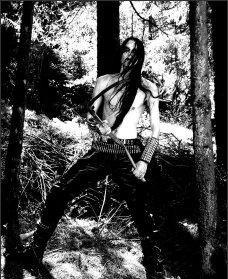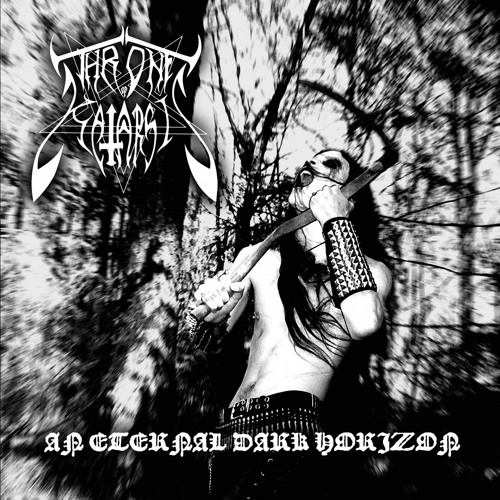
Info
- Band(s): Throne of Katarsis
- Interview Date: August 11, 2007
- Author(s): Dave Waite
As one of the most passionate and dedicated Black Metal bands in the scene today, Norway’s Throne Of Katarsis have garnered quite a name for themselves since their inception in 2003. Keeping the flame of the classic early 90’s era burning fiercely, their latest album ‘An Eternal Dark Horizon’ is a whitewash of biting guitars, whirlwind percussion and freezing atmosphere that sets like permafrost in the minds of all that have been fortunate enough to hear it. Having received critical acclaim the world over I felt it time to speak to vocalist/guitarist and co-founder Grimnisse about just how this album came into being, the thought processes behind it and the bands impenetrably dark future…
‘An Eternal Dark Horizon’ is a bludgeoning slab of Norwegian Black Metal that captures the primal rawness and heavy emotive (in the darkest sense of the word) drive of the 90’s scene, factors that many of today’s so-called Black Metal artists try and fail miserably to capture. With such a strong debut, what do you feel you have personally accomplished with this album?
I’m very satisfied with the cold and intense atmosphere we’ve managed to create on this album. The songs themselves has got lots of energy, and together with the right production we have certainly achieved what we wanted. We’ve focused on the essence of Black Metal, and we feel that this has shine through in all of the details, from the songwriting and production, to the cover art and layout.
Having been a work in progress, so to speak, for nearly three years and featuring some reworked tracks from your unreleased ‘Blodslakt’ demo and the much sought after ‘Unholy Holocaustwinds’ demo, this album has certainly been a long time coming. With the steadily growing demand by many a Black Metal fan to unleash the album and the fact that it is being released through Candlelight; did you feel any pressure when recording the material?
Not at all. We do this without worrying about who will listen to it, or what people might expect. We would still do the same thing if it was released in 66 tapes. We do this for ourselves, and never consider if the material is good enough for the label or the fans. If fact; the whole album was recorded, and mainly mixed before we got the deal with Candlelight, so there where no pressure from that side. We have never the less had full artistic freedom, and Candlelight has supported us. Even though we used long time finishing the album, we weren’t actually in the studio that long. The album was recorded in different sessions, and sometimes there where months between the studio sessions. Most of it was actually recorded on the first take. The mixing part however was a bit longer affair.
 Why did you choose to rework these particular songs and to what extent were they brought up to what you feel is the current context of Throne Of Katarsis’ sound?
Why did you choose to rework these particular songs and to what extent were they brought up to what you feel is the current context of Throne Of Katarsis’ sound?
We always knew that we would record all of our demo songs in a professional studio. We felt that the tracks was very good, and that they had more to offer than what the demos could provide. I’m very satisfied with the way it turned out, and I feel that we haven’t lost the rawness that is a big part of the demos, instead we’ve managed to make it more intense. I’m very into lo-fi Black Metal bands, and I like certain elements is such productions. Having this in mind throughout the whole studio session, we where able to capture these details and atmospheric feelings that I had in mind from day one.
Being a band that stick quite firmly to the aesthetics, outlook and sound of the ‘classic’ Black Metal era, it was somewhat of a surprise to find out that this album would be released through one of the bigger labels in the extreme music industry, Candlelight. Can you tell me more about how this deal initially came about? What was it that they saw in your music and from the other side, what was it that you saw in the label?
I feel honored being a part of Candlelight’s catalogue. It’s huge being under the same flag that Emperor, and later, bands like Obituary, 1349 & Furze. It all started out when we sent ten promos to bigger labels, a bit too big, we thought at the time. After a while we got positive response from three of these labels, and we first signed with the Greek label Black Lotus. Before we had sent them the master tapes, they got bankrupt or something, and we could then move over to Candlelight, who were a bit late with showing their interest. They first got in touch with us when we were deep into the negotiations with Black Lotus, so we first turned them down, but we are very satisfied things turned out the way they did. I can’t imagine sitting and thinking; ‘we could have been on Candlelight’. For us it was important to be on a steady label, that knew the market, and which had routines on everything. It’s good for us to focus on the music, instead of worrying about whether the album will be release or not, and if the label will make it throughout the year. They have so far respected all of our wishes, both musically and what the cover art and layout might concern, so we’re in good hands.
You have stated in other interviews that you need to be in a certain mood to create Throne Of Katarsis’ material. What (for lack of a better word) rituals are necessary for you to get into this mood? Is it more a question of getting inspiration from nature/everyday life or something more sinister?
I usually have to go deep into myself, to find a silent and dark space. This is important for creating the riffs or ideas from the very bottom, to first built the atmosphere, and then the right tones on top of that. I usually have some ideas to show to Vardalv, and together we put the parts where they belong, and make the additional music when trying out the composition. We have hardly any lights on when doing music, this to focus more on the themes and the feelings. We can get into a trance-like situation, where the music flows rapid, and we just have to record what comes out, there are too much to remember. Other times we can find ourselves struggling with progressing, and we have to break trough. We are very clear about one thing: the music shall come naturally, it shall never be forced out!
The most covering description on what inspires us has to be darkness. The darkness within ourselves, within man, and which to be found in the nature. It’s the anger, the frustration and the nature of the beast that keeps us inspired. Even though we have our inspirations of ourselves, we, together with all other third wave Black Metal bands, cannot forget that our main inspiration is other Black Metal bands. You cannot make this kind of Black Metal out of listening to classical music, or native folk music, etc, alone. For us it has been the early 90’s Black Metal scene in Norway. Therefore the music, the lyrics and the image is also based upon the great times of the Norwegian Blasphemy, the Black Metal elite. This was made us do Black Metal in the first place, and even though we don’t actually think of it anymore, the Black Metal is in our veins, and all musical expressions we use, and will be using in the future will be Black Metal. This has grown too big in us now, and will never let go.
Following on from the previous question, were the inspirations/experiences needed to create the music for this album the same when writing material for your previous releases?
You always need inspiration for doing music, and this album was no exception. We was probably more focused on the early Black Metal area at first, but we don’t really think too much of that anymore, yet it might sound the same for the listener. We just do our music, and what inspirations that lies beneath is also individual from song to song.

What about the lyrical concept for ‘An Eternal Dark Horizon’? Like your music and image, do your lyrics follow the path led by other Black Metal bands or do you find inspiration from sources other than death, darkness, blasphemy etc? Is there any kind of ‘concept’ to this album?
There are four different themes on this album. The first track, ‘Funeral Moonlight’, got the old rituals, devil worship, and plain madness. It describes how old rituals now can be used in our times tool; Black Metal. The next track, ‘Under Guds Hud’, are strongly blasphemous, a very direct lyric in this one, which fits the music perfectly. The title means ‘Underneath the Skin of God’, and includes a bit of Norwegian Black Metal history.. The third track, ‘Symbols Of Winter’, leads us directly into a blizzard, and a mans last walk. This is the part one of a story where this man freezes to death, while begging the Northwind to take his soul to the other side. The forth track, ‘Nattaander’ contains the search for total solitude, and where hanging is the last and final output. The last track, which is the title track, is the part two of the story that took place in ‘Symbols Of Winter’. The Northwind has now collected the soul, and on their way to the eternal dark horizon he becomes a part of what he once feared, and becomes one with the storms, the Night-spirits and Ghosts, and the nature which killed him. Of course, there’s much more to these lyrics, this is just a bleak and quick summary.
In the past when you recorded your two demos, you have said that the rawness of their overall sound was due to the fact that you only had access to a tape-recorder. Obviously now being signed to Candlelight you are able to work with bigger budget in a proper recording studio with producer Stein Sund at your disposal. With such a huge transition, were you at all surprised to hear just how good your music really is? Did you expect it to sound so fucking huge?
We where probably a bit surprised, but we always knew where we were heading while writing, recording and mixing this album. The coldness and atmosphere was always on our minds, but the fact that it turned out that intense was a thing we didn’t dare hoping for. Yet there was allot of work making the sound, so this is a result us hard work and keeping the focus all the time.
Likewise when you are writing the material, do you need to be in a particular mood when recording it? Studios can be very atmospherically flat places, so I just wondered if this at all detracted from how you envisioned the overall sound of ‘An Eternal Dark Horizon’.
The mood comes from inside, so that has not been a problem. However, we do turn out the lights, and lately we’ve only used candlelights while playing. This helps us focusing on the music actually.
Having read that you intend to perform your unholy black plague in the live arena, what can we expect from your live performances? Do you feel that playing live takes away from the atmosphere of Black Metal music, or on the contrary, makes it sound even more bombastic and majestic?
Our ceremonies includes a raw visual part, and we decorate the stage with candles, skulls, inverted crosses and torches. The corpse paint and spikes is of course a important part of the show as well, together with Vardalv’s fire breathing. We’re always doing a very good visual show, lots of energy on the stage. I feel that the show don’t take away the atmosphere from our music, and with such incredible feedback we have gotten, I don’t think we do anything wrong doing this. I know some actually prefer the live sessions instead or listening to the album because of the large sound we create while performing. We’re planning our first European tour to be scheduled this Autumn, and it will include the very special and blasphemous Sathanas In Gloriam festival in Rotterdam. The rest of the tour will be announced soon at our website.
For live purposes you have added Lord Imales (bass) and Godhate (Guitar) to your line up. How do you choose your live musicians? Are they people you knew beforehand or did it take a while to find musicians that shared your artistic/philosophical ideas?
I’ve known Lord Imalas for a long time, and have experienced that we’s a really good bass player for quite some years. He has played , and are playing bass in various serious acts, and we are very proud of having him on our team. Godhate has been with us almost a year now, and we are very satisfied with his contribution. He’s a very skilled guitarist who is very dedicated. We feel that we’ve got the perfect line-up now.
In the past you have experimented with recording in Liarlund Forest for the last track on your ‘Unholy Holoustwinds’ demo, ‘Skogens Kall’. Did you try any such ideas for the new album or was it a 100% studio affair?
This time we recorded wind-effects and the sound of burning wood outside, and the ceremony from the intro were not recorded in the studio either. I do believe that we’ll continue to record different sessions in the forest, a special feeling appear when doing these things.
To finish, where do you see Black Metal heading in the next few years? With many bands now focused on experimentation stripping down their sound with electronic, ethnic influences, I wondered if you see the music heading further in this direction or regressing to its more primitive beginnings.
Black Metal has had it’s peak a long time ago, that’s for sure, but there’s still a few bands worth listening to. I really don’t believe that we’ll see another age like the one we had in the early 90’s, not a chance.
